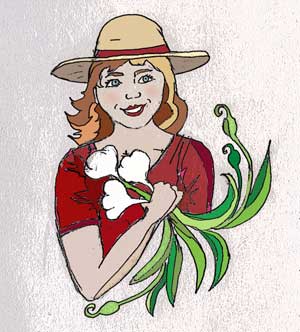Farmer's Market Tips for Growers
Eight Great Farmer's Market Tips
Do you want to sell at a farmer's market? Here are some things to consider before you commit to getting up way too early in the morning!
1) Know the rules, regulations and operating guidelines of your farmer's market.
- Some markets accept only homegrown fruits and vegetables. Other markets allow sales of meat and eggs. Certain foods may need to be certified or processed in an approved kitchen. These regulations can vary between states.
- Many markets allow you to sell a variety of handcrafted items. Often there are rules on 'homegrown' or 'homemade' compared to 'purchased' or 'resold' foods and crafts. If you have a semi-home made product make sure it qualifies for the market before you spend all winter making 3,000 of them.
True story: I know someone who worked all winter on their product only to find out that their 'homemade' item wasn't 'homemade enough' for the local farmer's market. Luckily they had other places to sell their product. - Sometimes people selling certain items are grandfathered in since they have been at the market so long. You may not be able to sell similar products. In other cases, only a certain number of venders are allowed to sell products to avoid oversaturating the market. My uncle sells at Pike's Marketplace in Seattle and they have a committee that approves new venders and their goods (normally they must be unique and handmade). Older venders are grandfathered in and can sell more diverse or commercial products.
- Some markets may require you to carry liability insurance.
- Farmer's markets may fine, penalize or 'fire' you if you are late or absent on days you agreed to be at the market.
- You may need to collect sales tax or have the sale's tax included in your price.
- Some farmers markets are controlled by Farmer Market Czars or Bullies who may selectively enforce rules depending on if they like your looks, arbitrarily decide they don't like people, pick fights with people or otherwise unfairly treat venders.Please ask discrete questions of local farmer market venders to find out the reputation of the person or committee who enforces your local farmer's market. You may or may not decide that it is worth it to deal with a petty vegetable dictator. By the way, if you are selling in a market with such a bully I suggest you organize the other venders to get fair treatment.
2) Do market research before you grow or make stuff to bring to market.
- Go to the market and check out the offerings early in the day and just before closing to see what sells and what doesn't.
- Make sure to check throughout the season for availability and prices.

3) Find your marketing niche.
- What unmeet needs can you see? If 10 people are growing heirloom tomatoes but nobody is growing heirloom peppers there could be a need to fill that niche.
- But only if you love to grow heirloom peppers. Don't try to grow a vegetable you hate to grow.
4) Be cheerful. If you don't want to be happy or smile at customers at 7 am you shouldn't be selling at a farmer's market. I suggest giving advice over the internet instead; I have found out that I can do that at anytime and nobody tells me to smile.
It is the rare person who can be grumpy and still have people lining up for their wares. Some people do manage it but you must have at least two or more of the following characteristics:
- A quaint adjective attached to your name like 'Old Pete', 'the Strawberry Lady', 'Ben the Egg Man', 'Scowly Marge' or 'that Crazy Garlic Woman'
- A reputation as quite the character
- Eccentric mode of dress
- An extremely desirable or rare product
- A wonderful and beautiful product that tastes so heavenly that people can't resist it
- A tendency to make people work to buy your product (you don't just sell to anyone with money)
- Longevity; you have been at the farmer's market since before the Cretaceous age
5) Build relationships with your customers.
- Tell people your story and hear their stories. People like to know that you consider them important. Plus you get to hear some really interesting tales.
- Remember what your regulars prefer or their 'usual' order. Jane enjoys chatting with our customers and always remembers them. Since we filled orders by hand we usually remember people's names and if they have ordered before. Little things like that are important.
6) Good customer service.
- Be cheerful, upbeat and nice to customers.
- If someone is unhappy refund their money or exchange for something they want.
- Once in a while throw in a free treat for your regular customers 'just because you can'.
- Only sell good products.
7) Organize your farmer's market stand.
- Bring only what you need (unless you want packing and unpacking to be an all day event).
- Consider using a check list at first to make sure you have all you need.
8) Start small and work your way up.
- You may hate sitting at a stand or interacting with people early in the morning; it is better to find that out when you are just buying a day booth than when you have just purchased a season stall.
